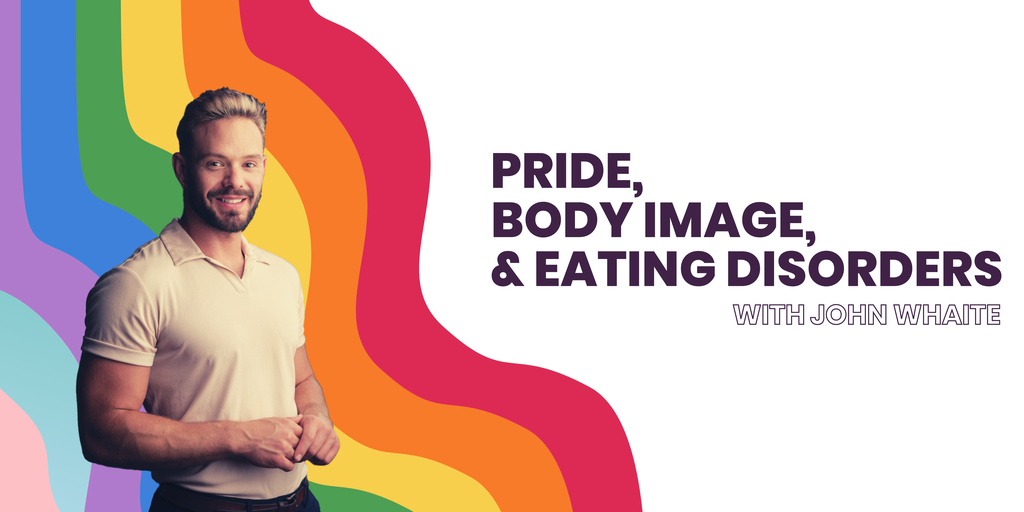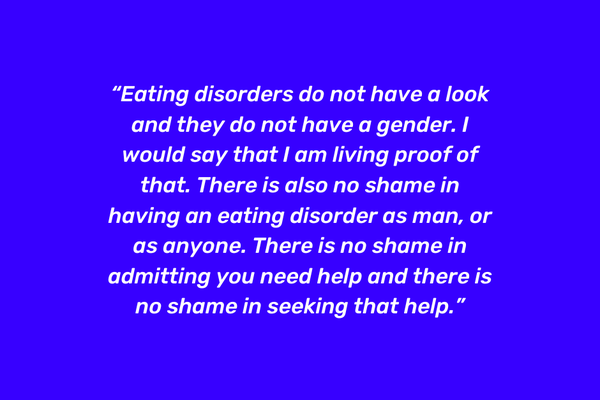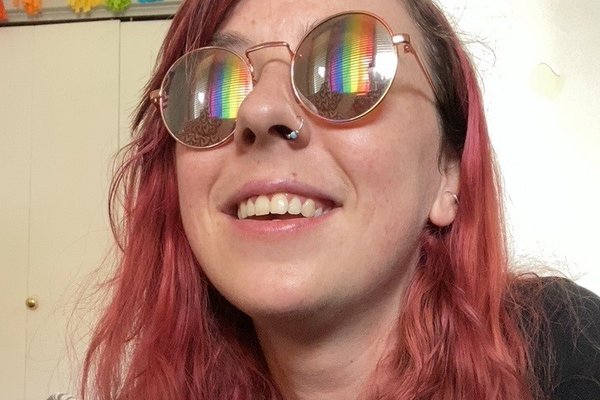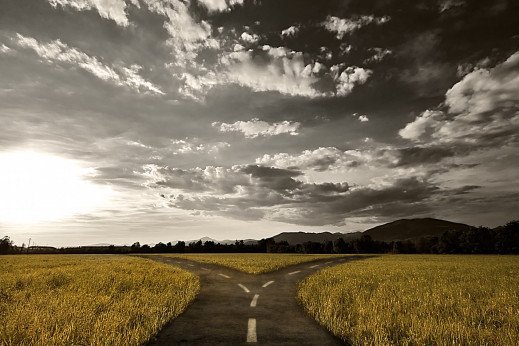
Celebrity chef, former Bake Off winner and Strictly superstar, John Whaite has become a household name across the UK (and every single Beat office).
Renowned for making Mary Berry swoon with boozy bakes and pulling perfect scores with high power Jives, it’s no wonder he’s earned ‘national treasure’ status. But today, it’s not his recipes I’m after.
I sat down with him on a sunny afternoon, to talk all things Pride, body image and eating disorders. Credit where it’s due, he answered every single question - however tricky or downright intrusive.
So this is your trigger warning: our interview gets uncomfortably honest at times. If you’re feeling vulnerable, it may not be the right time for you to read it. That said, if you want to be a better ally to the LGBTQ+ community (and you’re feeling tip top) - it’s your civic duty to listen to John.
John Whaite! Thank you for celebrating Pride Month with Beat. As a gay man, can you tell us a bit about your experience with eating disorders?
Well, I think my bulimia stems, in part, from the internalised shame of growing up gay. Whether that was fear of rejection from my family or being bullied in school for acting ‘camp’ — the only thing I could control was my image. In school that was by dyeing my hair frequently and dieting.
From an early age I restricted calories or carbs, and towards the end of college I started to binge and purge. At first it wasn’t a regular thing — just every once in a while — so I didn’t talk to anyone about it.
I wasn’t afraid that it would become the problem that it has.
Did you seek any medical treatment?
I’ve never spoken to a GP about it but I’ve had private psychotherapy.
How was that?
It worked fairly well! But whenever I’m making good progress in treatment, I seem to walk away from it. I don’t allow myself to fully commit to make enough change.
I imagine a lot of people would relate to that. What made you go public with your experiences?
I first spoke about it towards the end of 2020 when I realised the importance of nutrition for bodybuilding. I’d lifted weights for years but was always so restrictive with my calorie intake. What I learned that year, was that supplying my body with the nutrition it needed meant it could function properly. I am under no illusion though: my weightlifting is in itself a manifestation of my eating disorder and body dysmorphia.
Was your therapist able to help with body dysmorphia? What's the best advice they ever gave you?
That my thoughts are not fact.
When I have an urge to binge or even just a destructive thought around a situation that could easily trigger an urge to binge, it’s so important to question those thoughts. It isn’t about gaslighting yourself, but about asking ‘is what I’m feeling a proportionate response to the reality of the situation? How can I protect myself from feeling this way again?’.
We’d love to see more men getting that kind of support. Unfortunately, we’re still fighting against the stigma that eating disorders are a young, white woman’s illness.
That just isn’t true. Eating disorders are as unique as the people they affect. They are a learned psychological response to situations and trauma, so anyone that functions on a psychological level can develop an eating disorder.
On that note, a recent report found that the LGBTQ+ community is three times more likely to suffer from an eating disorder. Why do you think that is?
I think some members of the LGBTQ+ community have a much more difficult time accepting themselves, flaws and all. I think this starts by growing up in fear of rejection, which in turn becomes a deeply inbuilt shame. That shame gets in the way of forming a fully accepted identity within oneself, and so we look for external ways of achieving validation — whether that’s through a sex, drug or alcohol addiction, or coping strategies that form an eating disorder.
Often it can be a mixture of many different validating habits.
So what would you say to other gay men who may be struggling with an eating disorder?
Talk. It’s the only way you might have a chance to break the vicious cycle. Eating disorders are veiled by shame and they thrive there.
So by opening your heart and mind and sharing your experiences in a safe environment, with someone you trust who will offer you reassurance and validation, you have a fighting chance.
Has your sexuality become a positive force in your recovery?
As a gay man, I now understand the importance of ‘chosen family’ and community.
I think the fact that often we allow ourselves as queer people to be consciously vulnerable and talk about it openly means there’s more opportunity to seek comfort in each other’s experiences.
So your community was a big help?
Definitely. The very notion of a community is that a group of likeminded but unique people come together to achieve something or make change.
I think the thing that is fundamental in my own recovery is working hard on platonic relationships with friends that are based on trust and empathy. They don’t necessarily need to be fellow ED sufferers, just simply an open-hearted, non-judgemental shoulder to cry on.
There’s evidence to suggest that stress and fear of discrimination contributes to eating problems for LGBTQ+ people. Do you or your friends relate to that?
Totally. Even to this day, as a proud LGBTQ+ community member, I still fear rejection. Because there are people out there who, on a daily basis, make their disdain for our existence a very public declaration.
Not that it matters one bit what a certain bloke on Twitter may have to say, but when that sort of flak is fired so frequently towards you or your community, it certainly has an erosive effect.
So how can we be better allies? And what can we do to fight small-minded societal perceptions?
That’s the million-dollar question!
Acceptance is key. Non-judgemental acceptance and empathy are the only solutions to so many problems – from eating disorders to extreme poverty, from racism to transphobia. But acceptance isn’t just a switch that is flicked, it takes education and a willingness to elicit change.
On a side note, I do want to ask you about body image. What do you think we can do as a society to celebrate our bodies instead of objectifying them?
I’ve noticed that since I started bodybuilding more people seem to be interested in what I have to offer and say.
That may partly be a projection on my part as I feel more confident in my body – which is a ridiculous thing for me to say but is sadly a fact. And whenever I open Instagram or social media, I’m bombarded with a 50:50 split of cakes and incredibly ripped male physiques.
We are in a tangled mess with objectifying other people’s bodies, and there may not be a remedy to that – we might have gone too far.
Thing is, if we admit defeat — nothing will change.
You’re right. I think the only thing that would help, is if every single person on the planet valued their own bodies with more respect, because they would then know the price of objectifying another, which in turn would lead to an abandoning of highly sexualised adverts, fashion trends, ideals of the perfect body, etc.
But this problem is now an industrial one, and corporations that are concerned with profit margins over social purpose are never going to help quash people’s idiosyncrasies that ultimately form an urge to buy.
I’d love to see Beat doing it though!
We’ll do our best! Before you leave us John, a final question. What does Pride mean to you?
Pride is about working towards justice.
Equality and justice aren’t the same thing, and the queer community (as with people of colour, women, disabled people and most minority groups) have suffered years of grave injustice.
You can’t just gloss over that with an equality brush and say ‘ok, we’re all equal now so let’s live in harmony’. First we have to remedy that injustice by making good the harm that has been done.
But what I consider an important point that is often overlooked is that Pride is for straight people, too.
The dads who wear t-shirts that say ‘Proud dad’ on them for me have so much of an emotional impact, because that’s the kind of allyship that can change the world.
So I want to reassure any straight person reading this who thinks Pride is set to exclude them: it isn’t, it’s here for you too. But please use your power to help us reflect on the wrongs of history to change the landscape of the future.
From all of us at Beat, thank you John — and happy Pride Month!
*If John’s journey to recovery rings true for you, please reach out to us. Our Helplines are open 365 days a year, and you can also download a ton of helpful resources on our website.
One Size Does Not Fit All - James’ Story
24 March 2025Eating disorders do not have a look and they do not have a gender. I would say that I am living proof of that.
"Accepting who you are is freedom": A Pride Q&A with Sarah, Beat Support Officer
5 July 2022 Read moreWhat happens when you start to feed your brain again?
5 May 2021You have to learn how to live again and, like with any lessons, you often have to fail to learn the best way or the right way...


